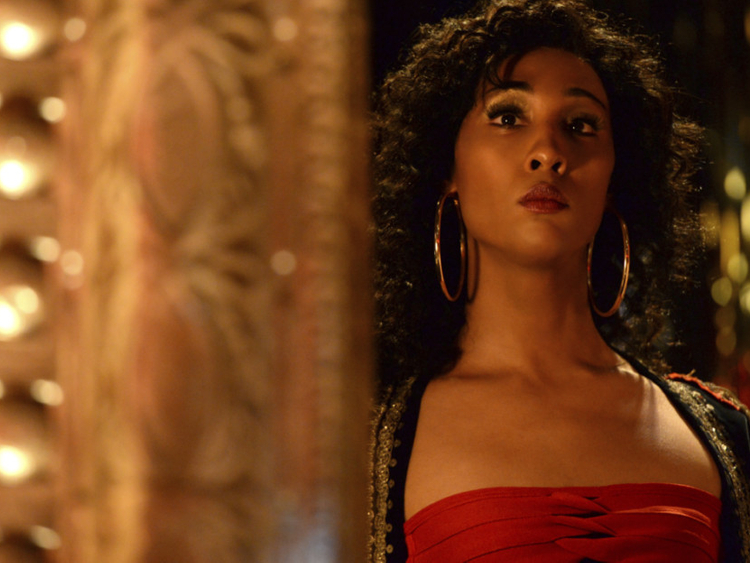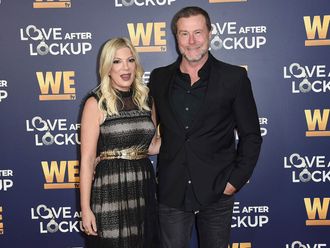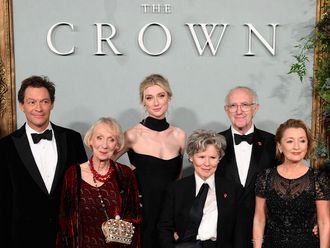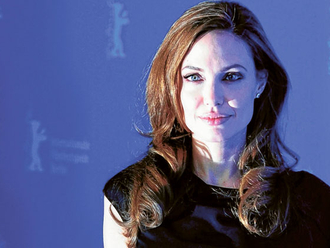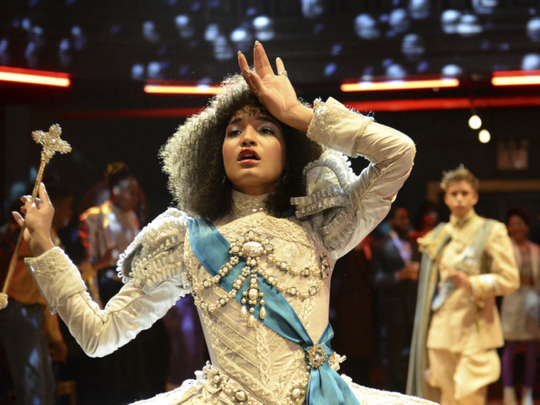
“Strike a pose,” Madonna commanded in the 1990 single Vogue. It’s the very pose meant by the title Pose, a new series set against a New York City backdrop of late-1980s LGBTQ black and Latino ball culture, when self-styled “houses” went head to head in underground battles of fabulousness. (The scene, it should be noted, continues to thrive, way beyond New York.)
Created by Ryan Murphy, Steven Canals and Murphy’s Glee and American Horror Story co-creator Brad Falchuk, the series will strike some as a fictional expansion of Jennie Livingston’s 1990 documentary on the scene, Paris Is Burning, shot around the time that Pose is set.
Indeed, it’s a film the Pose creators seemed to have gone through frame by frame, mining it for themes and details and working them into something less gritty, more dreamlike and fantastic and romantic. At the same time, they scrupulously communicate the rites and rules of the scene, threading them with love stories, theatrical drama and sports tropes and social issues.
Like Glee, Pose is a story of people who find themselves through competitive performance. You may be reminded of the aspirational movie musicals of the 1980s: Purple Rain, Footloose and Flashdance. It has something too of the giddy spirit of Baz Luhrmann’s hip hop origin story The Get Down, cut down in its nostalgic prime after a single season, a fate I would not predict for Pose.
The balls, described here as “a gathering of people who are not welcome to gather anywhere else, the celebration of a life the rest of the world does not deem worthy of celebration,” involve a host of fashion-derived and dance-based categories in which contestants seek to display superior “realness,” skill or style. There are trophies (big ones) and titles. Frequent winners gain the title “legendary.”
Pose begins absurdly, with six-time Mother of the Year Elektra (Dominique Jackson) leading her House of Abundance on a museum raid to steal costumes for a ball, which proves surprisingly easy. (Just as absurdly, all charges are dropped.) The series progresses in a mix of tones in which the obvious trades with the subtle, the declamatory with the conversational. Some scenes play like PSAs, bearing messages meant for a world where Aids is still a disease without a cure, if no longer one that comes with a death sentence. Others shock you with unexpected delicacy.
Throughout, the series runs on a kind of self-supporting enthusiasm, and is borne aloft by some extraordinary performances. Most notable are Mj Rodriguez as Blanca, who breaks away from Elektra and her House of Abundance to form her own House of Evangelista (“inspired by Linda Evangelista, who stole my look”); Indya Moore as Angel, who joins her there; and Billy Porter, a 2013 Tony winner for Kinky Boots, as Pray Tell, who emcees the balls, sews costumes and works at Macy’s as a “cologne spritzer.”
Rodriguez and Moore, who appeared together in Saturday Church, an independent film with a ballroom theme released earlier this year, have shorter resumes. But their work here is natural and moving; they ground what’s melodramatic in the writing and keep the fantastic elements in the production from swamping what’s human in the story.
Where Elektra rules her children like a queen, Blanca mothers them like a mother. “My house has rules,” she tells her improvised family, including “no drugs, no gentlemen callers and anything you mop belongs to the community.” (To “mop” is to steal.) At the centre of her concerns is Damon (Ryan Jamaal Swain), loudly thrown out of his parent’s house, who winds up sleeping in Washington Square Park, where Blanca discovers him dancing for change.
Above-ground white culture peeks in through the person of Stan Bowes (Evan Peters), who also aspires to a state of fabulousness of a less soulful sort. A New Jersey regular guy, the prize his eyes are on is a job in the Trump organisation. (Trump is not present; Stan’s immediate boss, played by James Van Der Beek, represents his corrupt spirit.) When Stan takes his wife, Patty (Kate Mara), to New York’s plush Rainbow Room (“I used to dream about having lobster like those fancy people down by the shore,” says Patty, establishing her mid-Atlantic working-class bona fides), the dance floor is filled with figures shuffling to music that was old before they were born.
But Stan has met Angel, who walks the streets for money, and his life has changed: “I want what I’m supposed to want,” he tells her. “I wear what I’m supposed to wear, and I work where I’m supposed to work ... I’m a brand: a middle-class white guy. But you’re who you are even though the price you pay for it is being disinvited from the rest of the world. I’m the one playing dress up.” This does not bode well for Patty.
Still, she might make out fine. There can be a streak of cruelty in Ryan’s television series, of looking on some characters with more judgment than understanding. But with few exceptions, Pose, whose people are living on the margin of the margin — and which features, press materials point out, “the largest cast of transgender actors in series regular roles, as well as the largest recurring cast of LGBTQ actors ever for a scripted series” — is kind to its subjects, who only want to become who they are.
“Do you know what the greatest pain a person can feel is, the greatest tragedy a life can experience?” Blanca asks the straight-world dance teacher she hopes will give Damon a chance. “That is having the truth inside of you and you not being able to share it, that is having a great beauty and no one there to see it.”
She is talking about herself too, and everybody else in this ultimately winning series.



